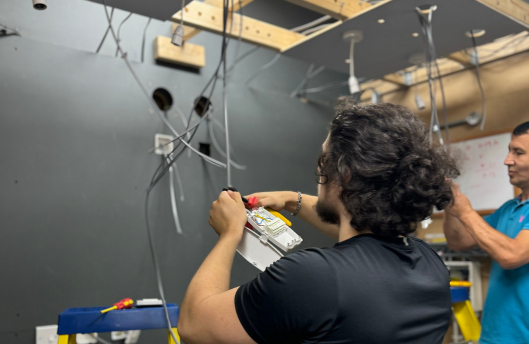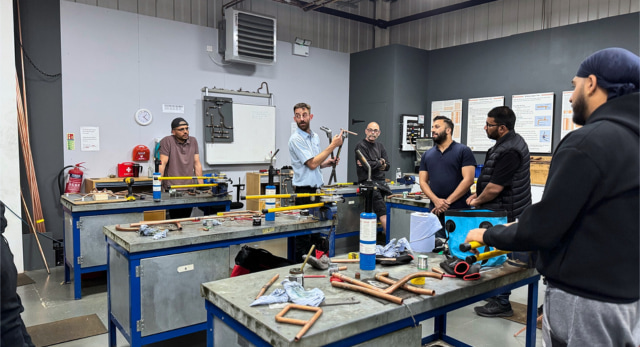In short, the best trade for you is the one that matches your unique mix of talents, interests, and ambitions to set you up for a rewarding, resilient, and prosperous career. If you’re eyeing a career that’s future-proof, pays well, and keeps you in demand, you’re in exactly the right place. Whether you’re a school leaver, career changer, or just fancy working with your hands (and brains), learning a trade could be your ticket to job security and a solid income. But with so many options, what is the best trade to learn in the UK in 2025?
What Makes a Trade “The Best” for You?
Choosing the “best” trade isn’t about following the crowd. It’s about finding the path that fits your skills, interests, and long-term ambitions. Every trade offers a solid future, steady income, and opportunities for career progression, but the right choice comes down to what motivates and excites you day-to-day.
At Logic4training, we’ve seen firsthand how varied those motivations can be. Some of our candidates, like Ryan Scott, chose plumbing because they loved working with their hands and wanted the satisfaction of seeing a job well done. He even managed to buy his own house at 22, while his uni mates were still figuring things out. Others, like Josh Scott, took inspiration from his brother and the desire to build a multi-skilled business, starting with plumbing and heating before branching into electrics and renewables.
Start by reflecting on your strengths and interests. Are you hands-on and practical, or do you enjoy solving technical puzzles? If you love working with your hands and seeing tangible results, trades like carpentry or bricklaying might be a great fit. If you’re fascinated by technology and innovation, consider electrics or HVAC, where new developments are constantly reshaping the field.
It’s also worth thinking about your lifestyle goals. Some trades offer more flexibility or self-employment potential, while others provide a clear route to management or specialisation. Researching pay, job availability, and future demand in your chosen field is key. After all, the best trade for you should support your financial and personal aspirations for years to come.
Don’t be afraid to talk to people already working in your shortlisted trades. Our trainees often say that speaking to Logic4training’s tutors, who’ve all worked hands-on in the industry, made a real difference in understanding what each path is really like day-to-day. And remember, upskilling and career advancement are always possible, so whichever trade you choose, you’ll have room to grow and shape your own future.
Why Trades Matter More Than Ever
The UK is facing a massive skills gap. Recent analysis shows nearly 937,000 new tradespeople are needed by 2032 to meet demand and replace retirees. This isn’t just about keeping the lights on or the water running; it’s about building the homes, infrastructure, and green technologies that’ll define the next decade.
Key reasons to consider a trade career:
- Job Security: Trades are resilient. Even when other sectors wobble, people still need electricians, plumbers, and builders.
- Earning Potential: Shortages mean pay is on the rise. Many trades now rival or outpace graduate salaries.
- Physical & Fulfilling Work: If sitting at a desk isn’t your thing, trades offer hands-on, varied work that makes a real impact.
- Multiple Entry Routes: From apprenticeships to fast-track courses, you can get started without a mountain of student debt.
- Room to Grow: Specialise, start your own business, or move into management.
The Most In-Demand Trades in the UK for 2025
Let’s get to the heart of it: which trades are set to boom, and why?
1. Electrician
If you want a trade that’s always in demand and pays handsomely, look no further. The UK’s push for renewable energy, smart homes, and electric vehicles means electricians are more vital than ever.
Why choose electrics?
- Shortage: Over 104,000 more electricians needed by 2032.
- Pay: Average salaries around £38,000, with top earners hitting £50,000+ (and self-employed ‘sparkies’ can do even better).
- Future-proof: EV charging, solar panels, battery storage, and smart tech are all growth areas.
- Flexible routes: College, apprenticeships, or private training like our Electrical Courses at Logic4training.
With the electrification of everything from vehicles to heating, electricians are set to remain at the heart of the UK’s infrastructure for years to come. If you’re looking for a trade that’s both future-proof and packed with opportunity for progression, becoming an electrician is a smart move that will keep your skills relevant and your diary full.
2. Plumber
Water’s not going out of style. With new builds, renovations, and green tech (think heat pumps and greywater systems), plumbers are in hot demand.
Why plumbing is a great career:
- Shortage: Projected need for 73,700 new plumbers by 2032.
- Pay: Average salaries £30,000-£40,000, with specialists and self-employed plumbers earning £50,000-£65,000.
- Growth: Sustainability and tech (solar water heaters, 3D printing) are transforming the trade.
- Entry: Apprenticeships, college, or our Plumbing Courses.
Plumbing offers a career that’s both lucrative and essential, with opportunities to specialise in green technologies and high earning potential for those who go self-employed. As the UK’s demand for skilled plumbers continues to rise, you’ll find yourself in a trade where your expertise is always needed and your prospects are only getting better.
3. Gas Engineer
Heating the nation is big business. As the UK transitions to greener heating, gas engineers with skills in renewables are especially sought after.
Why gas engineering is a winner:
- Shortage: 23,000 new gas engineers needed by 2028.
- Pay: Average salaries around £40,000, with renewables specialists and senior engineers earning up to £94,000.
- Future: Air-source heat pumps, smart controls, and hybrid systems are all on the up.
- Start here: Gas Courses.
Gas engineers are critical to keeping the nation warm and safe, and with the transition to greener heating solutions, those who upskill will be in even greater demand. Completing your Gas Safe registration is just the beginning. This is a career where ongoing learning translates directly into job security and higher earnings.
4. Carpenter & Joiner
Woodwork is timeless. Whether it’s building homes, restoring heritage sites, or creating bespoke interiors, carpenters are always needed.
Why carpentry?
- Shortage: Nearly 5,000 vacancies for carpenters and joiners in 2025.
- Pay: Average salaries around £32,900, with potential for more as a specialist or contractor.
- Variety: From site work to fine joinery, there’s something for every skillset.
Carpentry and joinery offer a blend of creativity and stability, with salaries rising as demand outstrips supply across the UK. Whether you’re restoring heritage buildings or shaping modern spaces, this trade gives you the satisfaction of seeing your work stand the test of time and pays well for the privilege.
5. HVAC & Renewable Energy Specialist
The drive for net-zero means huge demand for experts in heating, ventilation, air conditioning, and renewables (solar, heat pumps, battery storage).
Why specialise in renewables?
- Growth: Heat pump installations up 39% year-on-year; battery storage up 707%.
- Pay: Renewable heating specialists earn around £52,000.
- Impact: Help drive the UK’s green revolution.
As the UK accelerates its push towards net zero, specialists in HVAC and renewable energy are becoming indispensable for both domestic and commercial projects. By mastering the latest green technologies, you’ll position yourself at the forefront of a rapidly expanding sector, making your skills not just relevant today but vital for the future of the industry.
Best Trades to Learn for Women
Women are making significant strides in the UK’s trade sector, but there’s still plenty of room, and need, for more to join the ranks. Despite the fact that less than 2% of workers in trades like plumbing and construction are women, the tide is turning as perceptions shift and opportunities expand. Recent data from the Construction Industry Training Board (CITB) shows a 67% increase in women starting construction apprenticeships since 2018, with completions up by more than 170%, clear evidence that the industry is becoming more accessible and welcoming to women.
The Most Promising Trades for Women in 2025
While women remain underrepresented in roles like electrician, plumber, and carpenter (with deficits of tens of thousands compared to expected levels), these very gaps highlight the immense opportunity for women entering these trades now. The most popular and promising trades for women include:
- Electrician: As the UK electrifies everything from vehicles to homes, female electricians are especially sought after.
- Plumber or Gas Engineer: With the push for eco-friendly heating and water systems, plumbing & heating offers job security and good pay.
- Carpenter & Joiner: For those who enjoy hands-on, creative work, carpentry offers both variety and satisfaction.
- Brick Layer: More women are enrolling in bricklaying courses and finding that skill, determination, and teamwork matter far more than gender.
Why Trades Are a Smart Choice for Women
High Demand, Low Competition: The UK’s ongoing skills shortage means there’s a genuine need for more skilled workers, and women are increasingly sought after. Over a third of Londoners say they’d prefer to hire a female tradesperson, citing reasons like trustworthiness, respect for the home, and a desire to support women in non-traditional roles.
Strong Earning Potential: Experienced tradeswomen, from electricians to plumbers, regularly earn £30,000+ per year, and the gender pay gap is gradually narrowing as more women enter and excel in these fields.
No University Debt: Many trade careers can be started through apprenticeships or fast-track courses, allowing women to avoid hefty student loans and start earning sooner.
Role Models and Support: Social media is packed with inspiring female tradespeople, like The Pink Plasterer and Katie Kelleher, who are challenging stereotypes and proving that women belong in every corner of the industry. Platforms like TaskHer are also making it easier for customers to find and hire female tradespeople.
What’s Changing and What Still Needs to Change
The industry is finally recognising the need for diversity, with organisations like LCL Awards, CITB and employers actively promoting gender equality and improving working conditions for everyone. Schools and career guidance programmes are beginning to encourage girls to explore the trades, and hands-on workshops and open days are helping to change outdated perceptions. However, systemic barriers remain, and it will take continued effort by both women and men to make trades truly inclusive.
We can say that at Logic4training, over the past five years, we have seen more women walk through our doors to train with us and enter the trades or upskill, compared to previous years. See what they had to say!
Gas Apprenticeship
Julieta’s update
Plumbing to Gas Upskill
Emma’s testimonial
Electrical New Entrant
Christine’s testimonial
Oil to Gas Upskill Training
Amy’s testimonial
Plumbing New Entrant
Carolyn’s testimonial
Electrical New Entrant
Olh’s testimonial
F-Gas Upskill Training
Ciara’s story
Plumbing to Gas Upskill
Yasmine’s story
The Future of the Trades
At Logic4training, we’ve seen firsthand how the trades have transformed over the past two decades as well as how they continue to evolve at pace. Our experience training thousands of new entrants, career changers, and upskilling professionals has shown us that the future of the trades is shaped not just by new technology, but by the people who embrace it.
AI
The future of skilled trades in the UK is bright, even as artificial intelligence (AI) transforms industries worldwide. While AI is projected to impact up to 40% of jobs globally, trades like plumbing, electrical work, bricklaying, and HVAC remain resilient because they require hands-on skills, human judgment, and on-site problem-solving. Qualities that AI and automation simply can’t replicate. AI is increasingly used as a tool to enhance recruitment, training, and project management, but it won’t replace the essential, practical expertise of tradespeople. In fact, as the construction sector grows to meet ambitious housing and sustainability targets, the demand for skilled trades is only set to increase.
AI is only in its infancy, yet we have already seen jobs being displaced by AI. This trend won’t change. Luckily, the building services sectors, such as plumbing, gas, electrics etc, are part of an industry that will be resilient to AI job displacement. If you are looking to learn more about AI job losses & why tradespeople are safe from AI read our article and see how you can future-proof your career.
Growth and Opportunity
Looking past the impact of AI, the skilled trades sector is set for robust growth in 2025 and beyond. The UK’s ambitious housing targets, aiming for 1.5 million new homes in five years, combined with sustainability goals and major infrastructure projects, are fuelling unprecedented demand for tradespeople across the board. Roles like electricians, plumbers, bricklayers, carpenters, and renewable energy specialists are at the top of every employer’s wish list, with tens of thousands of vacancies and a persistent skills gap.
Salaries are rising, especially in regions with the highest demand, and the sector offers clear pathways for career progression from entry-level roles to senior management and specialist consultancy roles. The industry is also embracing diversity, with more women and underrepresented groups joining the workforce, and is placing a renewed focus on soft skills like communication, resilience, and problem-solving. Whether you’re just starting out or looking to upskill, the trades offer stability, variety, and the chance to make a real impact on the UK’s future, making now the perfect time to get involved.
How to Get Started: Training & Qualifications
When it comes to getting started in the trades, you’ve got plenty of options. Apprenticeships, college courses, trade training courses, or learning on the job. Each route has its own perks, whether you want to earn while you learn, get hands-on quickly, or fit training around your life. The key is choosing the path that matches your goals, experience, and how fast you want to get qualified.
If you want a clear, step-by-step breakdown of all your options, plus expert advice on how to get job-ready and future-proof your career, check out Logic4training’s comprehensive article: Learn a Trade in 2025. With industry-recognised courses, practical training, and full support from day one, Logic4training is the smart choice for anyone serious about building a successful future in the trades.
FAQs
What is the best trade to learn in the UK right now?
Electrician, plumber, and gas engineer are the top choices due to high demand, excellent pay, and future-proof prospects.
What trade pays the most in the UK?
Architects currently top the list for pay, but among traditional trades, electricians are considered the highest earners, especially with specialisation or self-employment.
What is the best trade for women to learn?
Women are thriving as painters, plumbers, and electricians, with opportunities and support growing every year.
How do I start a career in the trades?
You can start via apprenticeships, college courses, or training courses. Logic4training offers flexible courses for all entry levels.
Are trade careers future-proof?
Absolutely. The UK’s skills shortage, green tech boom, and ongoing infrastructure needs mean trades will stay in demand for years to come.









